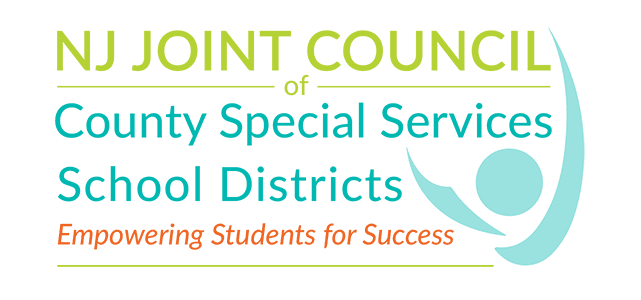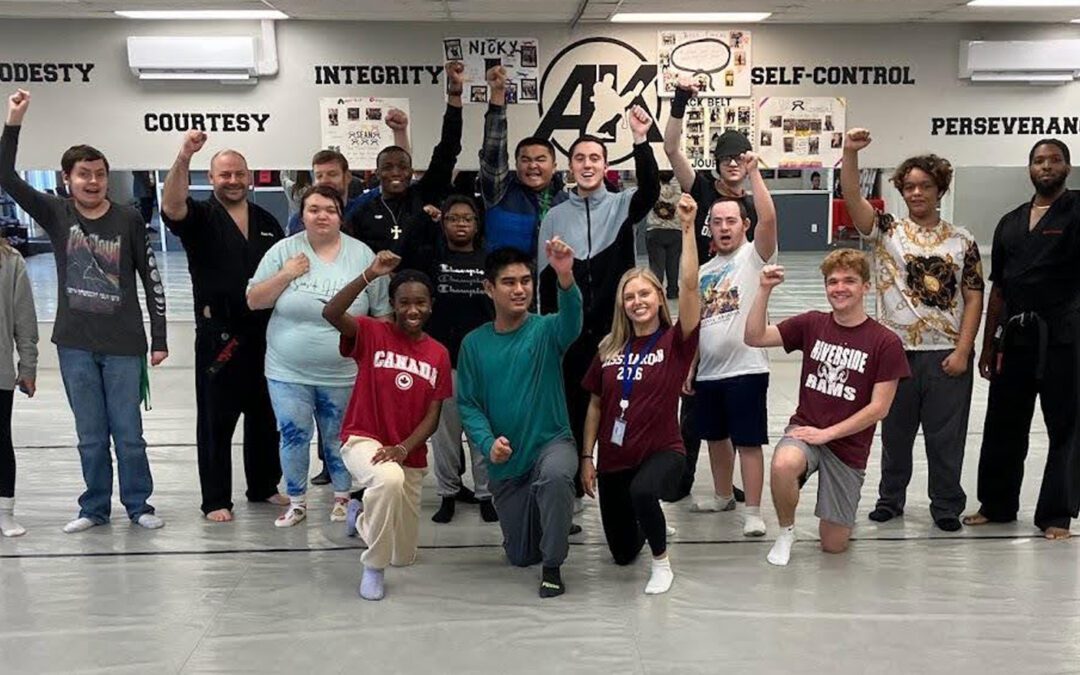Burlington County Special Services School District (BCSSSD) was one of the seven county special services school districts selected to receive up to $1.4 million as part of the Maximizing Post-School Outcomes for Students with Disabilities grant from June 1, 2024 to May 31, 2026. These post-school programs focus on preparing students, ages 18 through 21 who have completed their high school graduation requirements, for careers, community living, and independent life after school. The goal of these programs, like Transitions at BCSSSD, is to identify and strengthen each student’s values and abilities within authentic community environments.
When BCSSSD district leaders prepared the grant application, they saw it as an opportunity to strengthen existing programs by sustainably addressing resource gaps for young adults. The Transitions program is dedicated to improving post-school outcomes through future-focused planning that prepares students for essential aspects of adult life. The grant funding has allowed the district to expand services with a variety of new program development, strengthen partnerships, program enhancements, parent resources and supports, expanded adult education and community support and increased local educational agencies (LEA) involvement.
Program Development
- Taste of Transitions – The recent launch of the on-campus culinary program, Taste of Transitions, marks a significant milestone, made possible through the generous grant funding. This initiative has fully equipped a full kitchen with state-of-the-art appliances, necessary startup supplies, and uniforms for students, in addition to hiring a dedicated teacher and assistant to run the program. Taste of Transitions aims to foster independence in meal preparation, enhance daily living skills, and provide valuable work-based learning experiences that will improve students’ future employment prospects. Participants will not only learn essential skills in cooking, catering, custodial tasks, inventory management, customer service, and workplace etiquette, but the program will also host bake sales, take-home meals, and catering services for various school and community events.
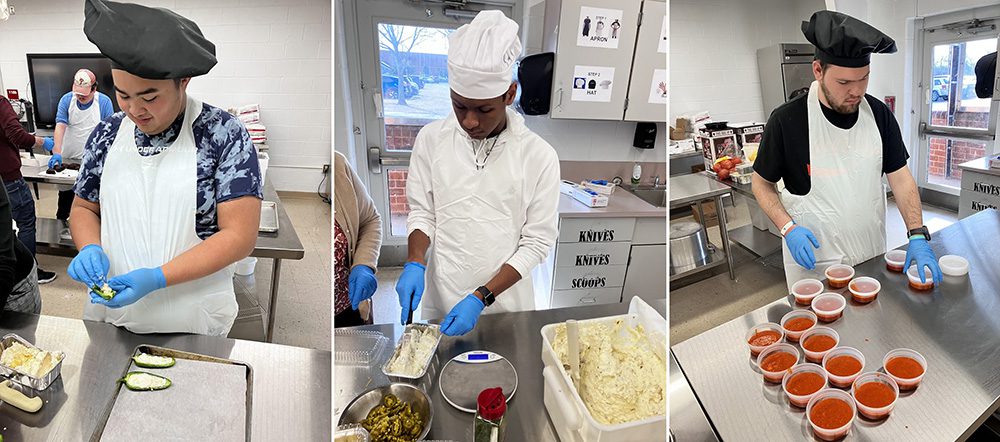
The addition of our Culinary Program, ‘Taste of Transitions,’ has proven to be one of the most impactful aspects of the grant. Its success has exceeded our initial expectations, leading to a multitude of positive outcomes that benefit our students and the entire community.” — Transitions at BCSSSD Principal Mary Jean Kneringer
Taste of Transitions is also a new partner with the Burlington County Library where young adult workers in this program prepare food for daily sales at the Community Blend at the Bestsellers Café . Both these programs enhance the soft and hard skills essential for employment success. Taste of Transition also keeps a cold vending machine, which was purchased with grant funding, fully stocked for library functions that occur outside of café hours.
- Community Blend at Bestsellers Café – Students utilize the Taste of Transitions classroom to prepare the food that is sold in the vending machines and storefront at Community Blend at Bestsellers Café, a functional eatery located at the main branch of the Burlington County Library in Westampton. The Café also benefits students with additional application of technical skills such as custodial work, retail skills and inventory management while also offering further practice with interpersonal skills such as customer service, workplace etiquette and problem solving.
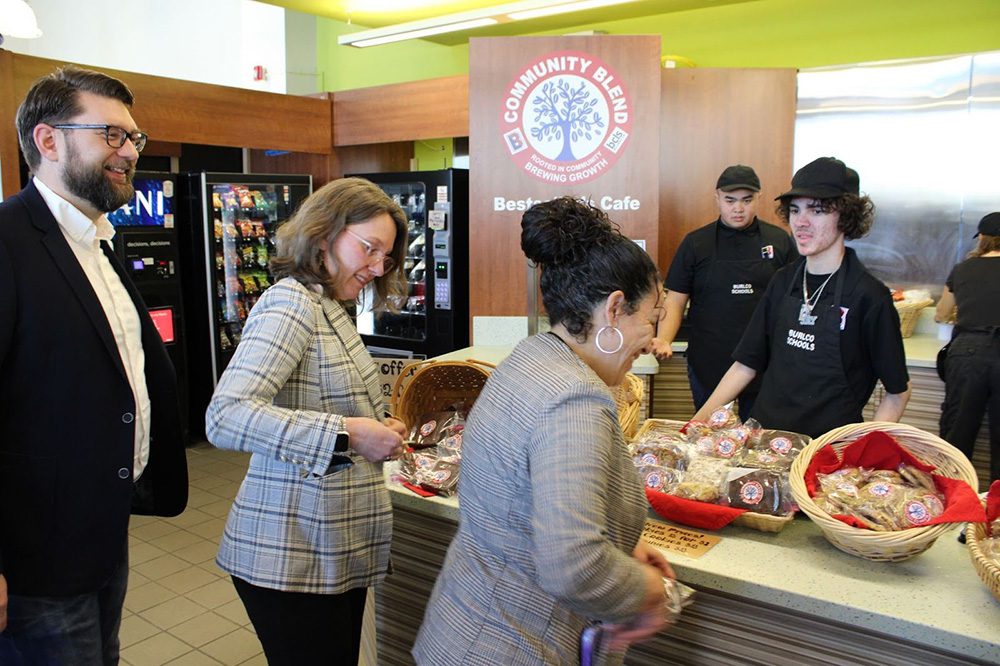
The Community Blend at Bestsellers Café is more than a Café. It gives students real-world experience, building skills and confidence for success. This partnership with the Burlington County Library creates meaningful opportunities that empower students and strengthen the community. We are proud to see them thrive and we’re grateful for our partners’ support.” — Superintendent Dr. Ashanti Holley.
- Transitions Treats – is a student-led vending machine business created through the school’s Work-Based Learning (WBL) program. The grant funding allowed the purchase of five vending machines to provide convenient access to snacks for staff and visitors. Transitions Treats is more than just a vending solution—it’s a real-world learning experience. Students take charge of operations, marketing, inventory, and customer service, gaining hands-on skills in entrepreneurship, teamwork, and financial literacy while serving the school community.
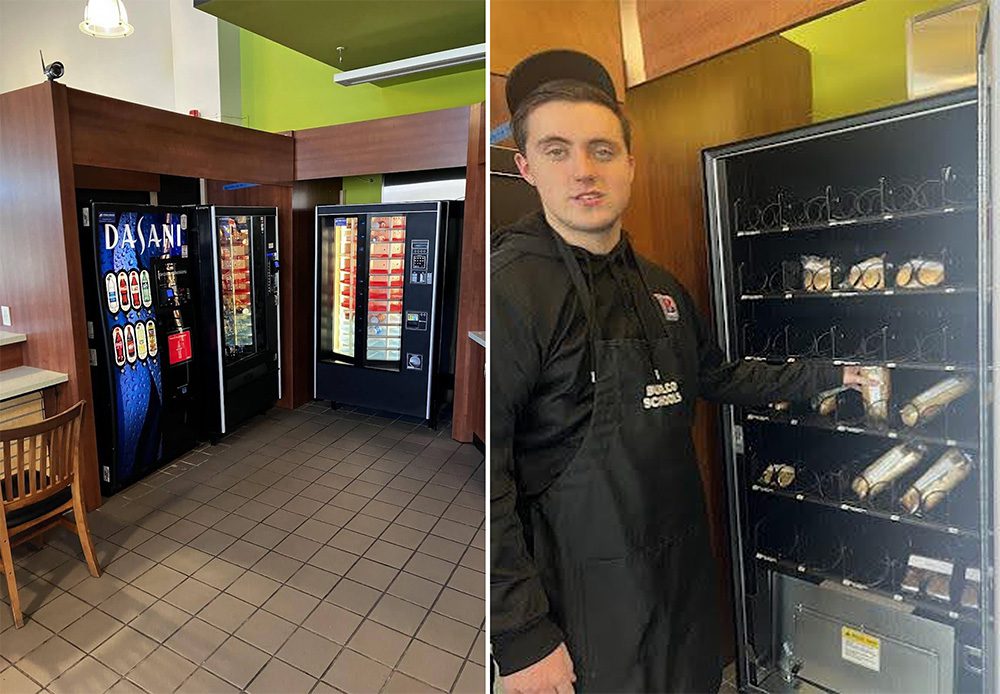
The power of entrepreneurship and innovation offers invaluable real-life skill opportunities for our students. These experiences not only prepare them for future careers but also foster creativity and problem-solving abilities, essential for success in today’s ever-changing world.” — Transitions at BCSSSD Work-Based Learning Coordinator Kelly Fletcher
- Project Search – BCSSSD has partnered with Virtua Memorial Hospital in Mt. Holly to bring the international Project SEARCH program onboard as another opportunity for young adults. As the educational partner, BCSSSD will collaborate with a steering committee, including the Division of Vocational Rehabilitation Services, Division of Developmental Disabilities, Department of Labor, and Best Buddies International. Prospective students must submit an application to be considered for the program and will undergo a comprehensive review by a designated steering committee prior to enrollment. The program employs a collaborative, team-based model, where each student receives individualized guidance and oversight from the steering committee. The objective of this partnership is to facilitate gainful employment for students following the completion of their internship experiences. A full-time teacher, whose position along with the Project Search licensure fees are supported through grant funding, provides consistent support throughout the duration of the program. Upon acceptance, students will engage in a series of three internship rotations, tailored to their interests, in areas such as patient services, custodial operations, and administrative office settings. To ensure meaningful engagement, no more than two students are assigned to the same internship at any given time. The program is designed with the ultimate aim of enabling students to transition successfully into the workforce upon conclusion of their internships.
- New Jersey Travel Independence Program @ Rutgers (NJTIP) – After hearing from many caregivers that transportation can be a challenge, BCSSSD used grant funding to partner with NJTIP to increase independence and self-sufficiency for young adults by empowering them to use the public transit system and rideshare safely and independently. Understanding how to use public transportation and rideshare helps students maintain their employment.The program consists of one full day of instruction in a classroom every other week for a marking period (two groups of students have gone through this program so far and two groups are participating currently). In the classroom, students learn how to access transportation schedules, use an app for transit, and pay. On the weeks when they are not in the classroom, they participate in community practice to gain firsthand experience using local public transportation such as BurLink, River Line, and New Jersey Transit buses. Topics like reading time schedules and allowing enough time to get to the bus stop are covered, as well as what to do when facing obstacles (e.g. seats are all taken or navigating with a wheelchair).
Strengthened Partnerships
Partnerships, both new and existing, have been strengthened with the help of grant funding. These include:
- Rowan University – Through a collaboration between Rowan University and Transitions, Rowan professors and college students are creating a portfolio that is central to the philosophy of person-centered planning. Part of BCSSSD’s goal is for students to begin developing their digital portfolios starting at age 14.
- In collaboration with Boggs Center on Disability and Human Development at Rutgers University’s Robert Wood Johnson Medical School, Transitions at BCSSSD is participating in two specialized training cohorts focused on intensive professional development and technical assistance. The first cohort centers on Person-Centered Planning in Schools (PCAST), while the second focuses on Community-Based Instruction (CBI).With strong support from district administration and grant funding to provide staff coverage, comprehensive training is being delivered to personnel across the district—including teachers, case managers, teacher assistants, and job coaches.Community-Based Instruction (CBI) cohort – The goals of this initiative involve providing comprehensive training in Community-Based Instruction that greatly enhances classroom teaching, ultimately better preparing students for real-world application and outcomes. This training includes targeted support to Job Coach training, CBI teacher development, and guidance on implementing the CBI curriculum.

The Rutgers Boggs Center is providing invaluable training to our teaching staff on the importance and value of Community-Based Instruction. This support empowers our educators to enhance their classroom practices, ultimately leading to improved outcomes for our students as they learn to generalize skills in their communities.” — Transitions at BCSSSD Principal, Mary Jean Kneringer
- Person-centered approaches in schools and transition (PCAST) – The training offered is elevating Transitions by embracing a philosophy that empowers every student to have a voice. It emphasizes teaching self-advocacy and recognizing the unique strengths and abilities of each individual. Teachers and every member of the Child Study Team are learning to facilitate this approach in classrooms and during IEP and other meetings. Trainers provide a curriculum, observe teachers with their students, model with the students, and then help the teachers with feedback as part of an in-depth process. PCAST meetings are inclusive and encourage participation from the education team, community team, behavioral supports, caregivers, friends, employers, and representatives from outside service agencies. The meetings encourage mutual respect, free writing, and open conversations about the student and how to support their success. The primary goal is to develop a deep understanding of each student and support their personal vision for a positive future. These meetings enable teams to collaboratively design positive and respectful support strategies to use daily and which can follow them into adult services.
Program Enhancements
Enhancing existing WBL and life skills experiences at Transitions to better prepare students for greater success was also a goal. Teachers and WBL Coordinators are integrating simulated work practices into current programs using technology such as smartphones, cash registers, credit card readers, touchscreen Chromebooks, FitBits, VR headsets, tablets, and inventory systems. Grant funding allows the district to pilot curriculum resources over a two-year period to determine which resources best meet students’ needs.
- Workplace training and Life skills programs – CareerSafe, which is an online training in safety with industry-recognized credentials; Digitability, a work-readiness program used in classrooms to prepare students for today’s workplaces; and Life Centered Education, Unique Learning System and Catapallo VR programs teach independent living, work skills, communication skills and more.
- Sexuality Education – School counselors received training in Elevatus, an evidence-informed, trauma-informed curriculum, which will be used to teach students about the importance of a healthy lifestyle. Training included workshops that prepared counselors to skillfully navigate the sensitive topic of sexuality. Students are now benefiting from having an outlet and getting factual answers to their questions.
- Washer and Dryer – Pioneer Posh, this WBL program received a washer and dryer to assist students in preparing clothing items for online sale and to support further laundry skills to promote independence at home.
- Culinary kitchen – Upgraded commercial equipment as well as additional equipment has been purchased to support the new Taste of Transitions Students prepare food and baked goods for Community Blend at Best Sellers Café, cater for professional development events, manage vending machines, and participate in many other activities. Through these hands-on experiences, students develop essential work skills.
- Other equipment – Cell Phones, computers, virtual reality programs, touchscreen laptops, tablets, and Fitbits help students develop familiarity with these technology resources.
Parent Resources and Supports
Facilitating partnerships and collaboration with stakeholders was one focus area to enhance outcomes for students and families. Grant funding made it possible to add a Transition Coordinator position to the team. Recognizing that families could benefit from more education and guidance when it comes to understanding and making the necessary connections to adult service providers, Transitions made a commitment to better evaluate programs and services. To keep this commitment, Transitions implemented the following initiatives to improve outcomes for students and caregivers:
- Stakeholder Surveys – These surveys were implemented to evaluate both the historical impact and current effectiveness of available programs. Surveys were distributed to key stakeholder groups—including sending districts, families/caregivers, students, and WBL business partners. The feedback collected will offer valuable insights to enhance collaboration and support data-informed improvements to our program.
- Parent Training Series – Supporting families with knowledge and resources was made available this year by introducing an evening Parent Training Series. Fourteen parent training topics were identified and offered to families while also providing parents with connections to adult service providers and agencies. Parent training is being offered in conjunction with the Pathways Plus program, the district holds parent training while the students are participating in their activities. These are open to anyone in the community.
- Resource Fairs – The Transition Coordinator also organized parent resource fairs in both the fall and spring. Each featuring over 40 community vendors, providing families with vital tools and helpful resources.
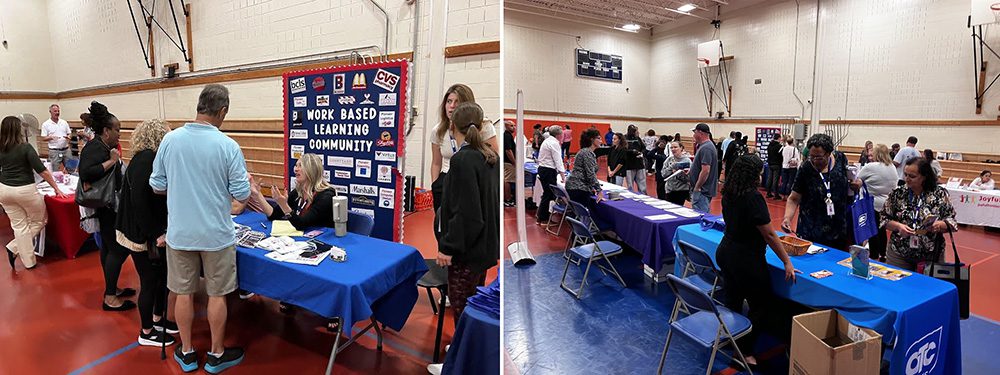
Providing families with the information they need to help their young adults access adult services and community resources is invaluable. Knowing that we can assist them in navigating this overwhelming information ensures vital connections are made before they age out of the school system, which is incredibly rewarding for our entire team.” — Transition Coordinator Samantha Weight
Expanded Adult Education and Community supports
- Pathways Plus – This is an adult education program that engages students in activities to increase the soft skills, such as problem solving and requesting help, needed for an independent life in a home or workplace. This program was born out of knowing that the district is doing an excellent job of teaching technical work skills, but the interpersonal skills which are important for both everyday life and at places of employment, needed further development. Pathways Plus includes activities like culinary and baking classes and clubs for Lego building, coding, and board games. Local high school seniors have been invited to participate as mentors and help reach the program’s goals of fostering social cohesion and a sense of belonging.
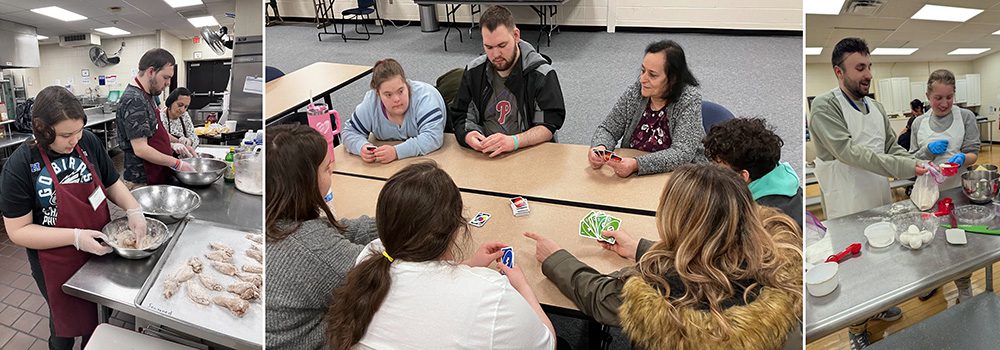
Teaching life and employability skills in the culinary and baking fields provides a unique opportunity to not only impart technical knowledge but also to reinforce essential hidden skills like problem solving, asking for help, and teamwork. The Pathways Plus program has been an incredible addition to our curriculum, enriching the learning experience and preparing our students for real-world challenges.” — Transitions Culinary Teacher Mike Romano
- RCBC and BCIT Adult Ed – These partnerships are being expanded so BCSSSD students can attend as part of the day program and also in the evening hours. Twelve BCSSSD students attend classes on the RCBC campus every Tuesday and Thursday. Classes include reading, writing, math, study skills, and computer literacy and give students the opportunity to be immersed on the college campus all day. The first BCSSSD student is now attending the BCIT Adult Education program in the Electrical Trades program earning an A, and is now in his second class in the sequence. This student’s success helps to encourage further participation.
- Job Coaching – Individuals in these roles receive additional hours to support students working in the community during evenings and weekends. The grant enables extended job coaching services, providing enhanced support to help student workers thrive in their positions.
Increased LEA Involvement
LEA involvement is being expanded to include neurotypical students at local schools. Partnerships have been formed to foster interactions between BCSSSD students and their peers from local schools and give them the opportunity to earn service hours.
- YMCA – Two new opportunities have been added through the YMCA, with memberships and transportation paid for through the grant. The district has purchased 20 memberships to the local YMCA to help reinforce soft skills while interacting with the community in prosocial ways, promoting health and wellness, and learning to utilize community resources. Students are bussed from the district on Fridays and also have the option to take advantage of the membership on their own time.
- Action Karate and Laurel Lanes Bowling – opportunities are extended for CBI trips to other venues to attend karate classes and bowling with LEAs. This partnership includes senior student volunteers from Riverside High School and BCAS who participate in these activities alongside BCSSSD students. The grant also pays for transportation to pick up our LEA student volunteers.
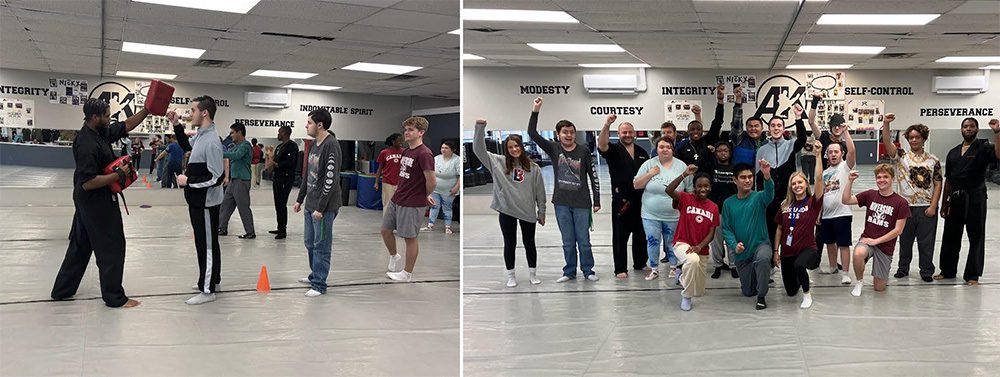
Reinforcing soft skills with students without disabilities from Riverside High School was incredibly rewarding for both groups. It was a win-win situation, allowing students to build empathy and understanding while enhancing their communication and teamwork abilities. This collaborative experience fosters inclusivity and strengthens our community as a whole.” — Work Based Learning Coordinator Matt Dennion
Coming Soon
The following initiatives are planned for the next school year, which would be covered in the second year of the grant funding:
- Vehicle simulator – This will be used for driver’s education and transportation training for a personal vehicle. Topics like rules of the road and preliminary education needed for the driver’s test will be covered.
- Fitbits – These are being purchased for students to use in school as part of a curriculum to encourage healthy habits and lifestyles.
- Inventory control and logistics program – This program will help develop workplace skills that are sought by area employers. Items within the in-house employment experiences will be barcoded to simulate what students would see in various warehouse positions.
- Adaptive equipment for the Independent Living Center will be added to support skills needed for independent living.
- The gaming equipment including New XBoxes, VR headsets, and monitors, in addition to adapted controllers will also support BCSSSD’s goal to form an Esports team where students can compete with neurotypical peers from other schools.
- QR code employee (student) badges for clocking in and out will be added to assist with program implementation and familiarize students with this process.
As exemplified by the abundance of initiatives that are being implemented by BCSSSD, this grant funding has a far-reaching impact. By strategically planning where to allocate funds, the district has been able to significantly bolster the services provided to students.
To read more about Transitions at BCSSSD, click here.
